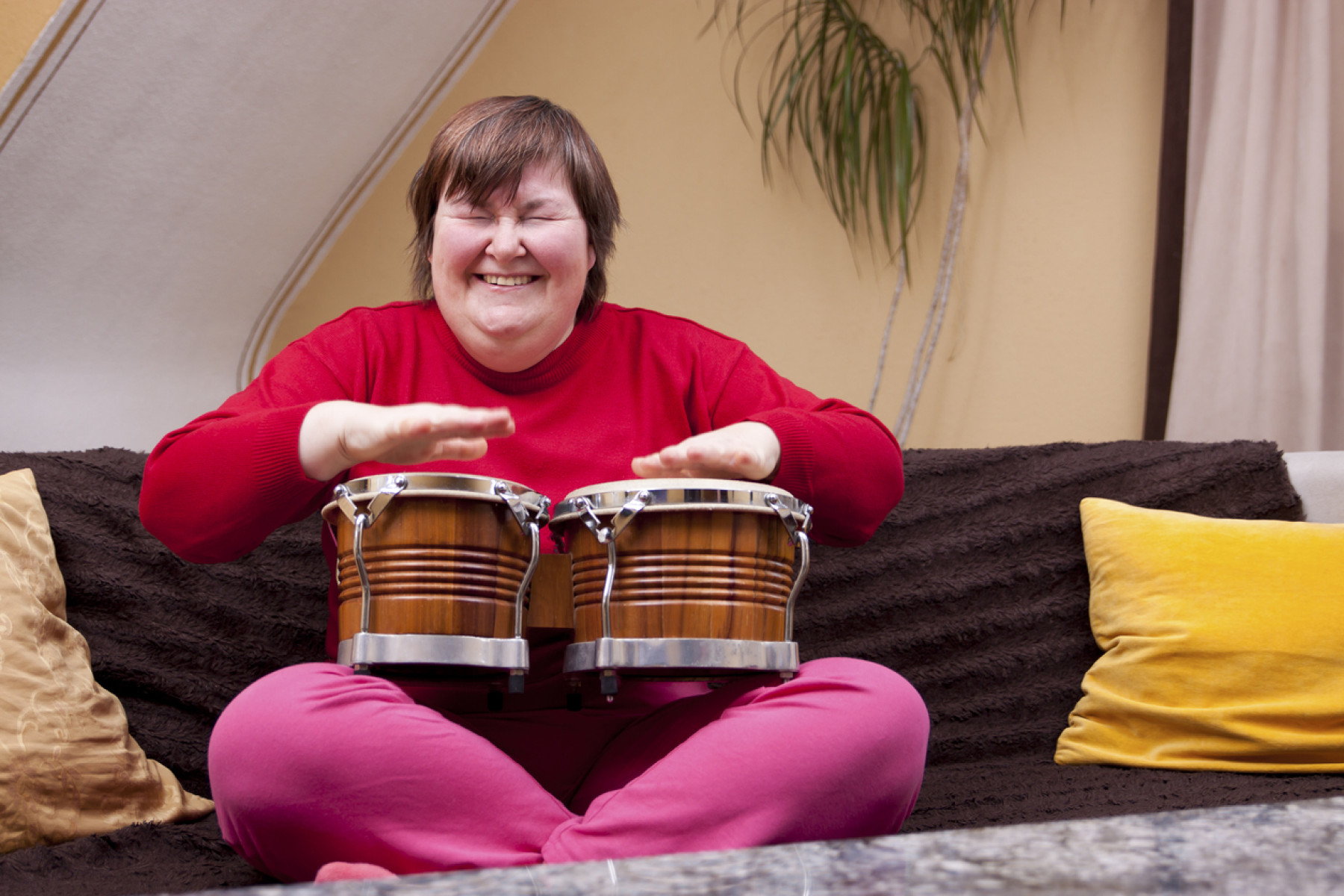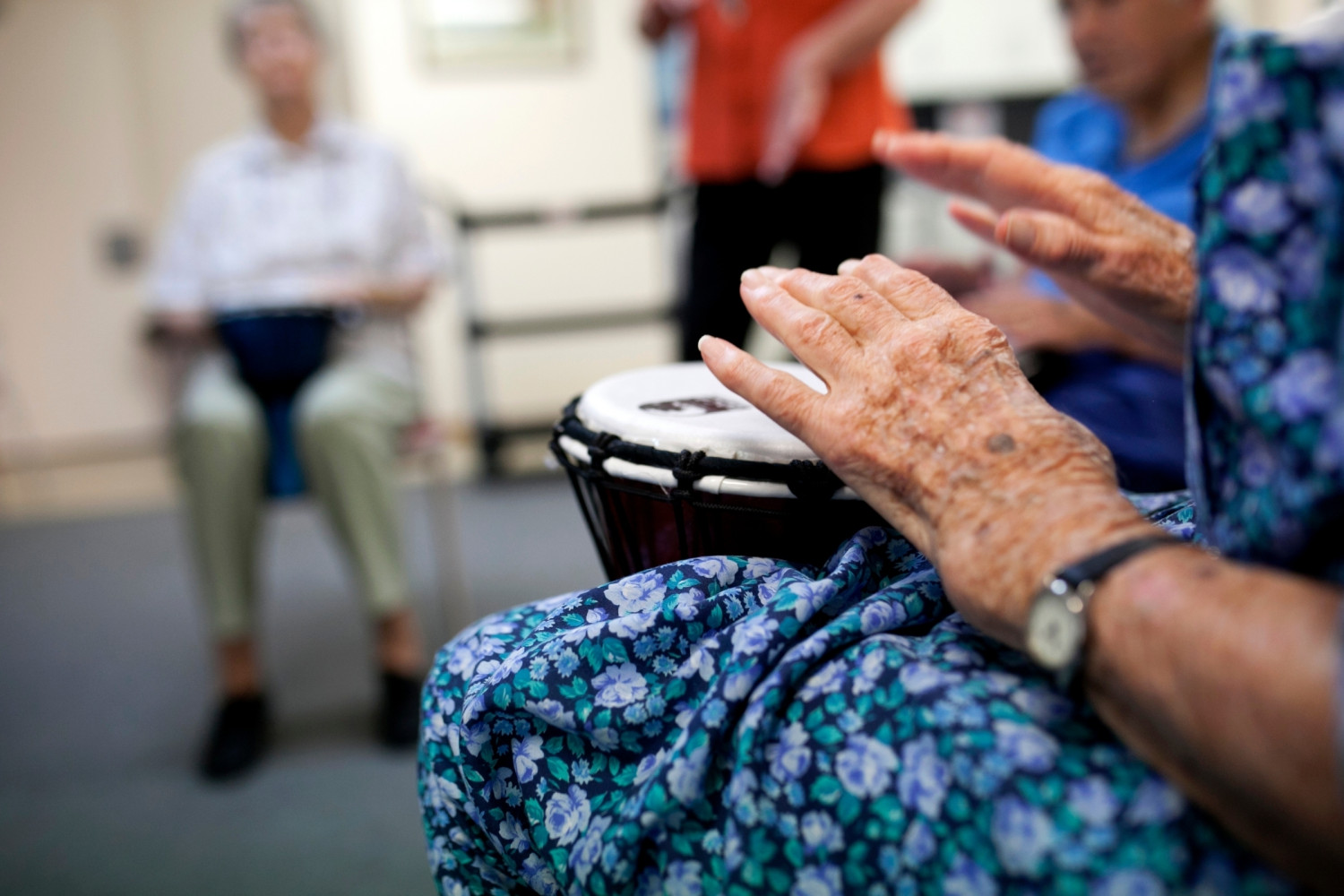What are the Benefits of Music Therapy
6 June, 2023
Most people can remember a moment when music has made them feel happy. Its power as a healing tool is undeniable, and music therapy for older people or people with dementia or a disability can result in improvement within their physical, social, and emotional health. Here, we explore the many benefits of music therapy.

What Is Music Therapy And How Does It Help?
The aim of music therapy is to provide a secure and nurturing space of acceptance through playing and listening to different forms of music. It is a form of creative therapy and just like art therapy (explore the benefits of art therapy), drama therapy and dance therapy, it can be used as an alternative to conventional therapies or in conjunction with them.
There is no one-size-fits-all approach to music therapy. In passive music therapy, clients may enjoy listening to music and be invited to visualise images. Favourite music chosen from your loved one’s childhood or younger years may be used to evoke engagement and recollection of happy memories.
In active music therapy sessions, participants are encouraged to try playing or improvising music, or taking part in other activities. This can involve playing an instrument, singing, songwriting or even dancing.
Throughout history, music has been recognised for its therapeutic benefits. In World War II, medical professionals noticed that when music was played, it positively affected the wellbeing of wounded soldiers. As time has progressed, neuroscientists have begun studying how music affects our brains and makes us react the way it does.
Music therapy has been shown to be an effective therapeutic intervention. Its benefits include:
Improving communication and social interaction
Reducing stress, anxiety disorders and other mental health issues
Enhancing memory and cognitive functioning
Promoting physical rehabilitation and pain managem
Increasing emotional expression and self-awareness

What Are the Benefits of Music Therapy?
The experience of participating in music therapy can be really enjoyable, helping us to feel and express a range of emotions. In people with issues communicating, responses such as singing or humming can promote reconnection with loved ones. Music is also known to move us, increase our holistic wellbeing and even make an impact on our sleeping patterns.
Participation can help people to learn, interact and grow while expressing feelings in a safe environment.
Research has found that music therapy helps us to connect with each other and the world around us. It can also have a range of other incredible benefits:
Pain management - Listening to music can help reduce the intensity of pain experienced by patients, including chronic pain and post-surgical pain. Music therapists have also been found to be effective in reducing pain and anxiety during medical procedures.
Emotional well-being - Music therapy has been found to be effective in reducing symptoms of depression and anxiety, reducing blood pressure and improving mood and overall emotional well-being. This is thought to be a consequence of the way that music affects the brain and releases endorphins and other brain chemicals that support well-being.
Cognitive functioning - Music therapists can improve cognitive skills in a number of different ways. For example, music therapy has been found to enhance memory and attention in individuals with dementia and other cognitive impairments, as well as improving language and communication skills in children with autism.
Physical rehabilitation - Music therapy has been found to be effective in improving physical functioning in individuals with a range of conditions, including strokes, Parkinson's disease, and traumatic brain injuries. It can help promote coordination, balance, and improve overall physical activity levels.
Overall, the research suggests that music therapy can be an effective treatment for a wide range of physical and mental health conditions. This being said, more research is needed to fully understand the mechanisms by which music therapy works, and to identify the most effective approaches for different individuals and conditions.

What Is Music Therapy Used For?
There are a huge variety of situations that music therapy is used for. Programs are designed to suit individual needs and requirements. This means that music therapy may differ for those living with dementia, compared to those living with disabilities, for example.
A good music therapist will ensure that sessions are relevant to the person’s interests, background and desired outcomes.
Music therapy can benefit a wide range of individuals, including children, adolescents, adults, and seniors with a variety of needs. Below, are some examples of the types of individuals who can benefit from music therapy.
Children with Developmental and Learning Disabilities. Music therapy can be used to promote communication, social interaction, and motor skills in children and young adults with conditions such as autism spectrum disorder, Down syndrome, and cerebral palsy.
Individuals with Mental Health Disorders. Music therapy can be effective in reducing symptoms of depression, anxiety, post-traumatic stress disorder (PTSD) and other mental health issues. It can also be used to promote emotional expression, self-awareness, and self-esteem.
Older Adults. Music therapy can be used to promote cognitive functioning, memory, and overall well-being in older adults with conditions such as dementia and Alzheimer's disease. It can also help reduce social isolation and promote a sense of community.
Individuals with Physical Disabilities. Music therapy can be used to promote physical rehabilitation and pain management in individuals who have experienced strokes, traumatic brain injuries or suffer from chronic pain. It can also help promote motor coordination, balance, and overall physical activity levels.
Individuals with Neurological Conditions. Music therapy can be used to promote cognitive functioning, communication, and social interaction in individuals with conditions such as Parkinson's disease, multiple sclerosis, and traumatic brain injuries.
Music Therapy for Older People and People Living With Dementia

The inclusion of music therapy can have positive outcomes for people in aged care settings, and in managing the cognitive and emotional effects of dementia. Research by the Anglia Ruskin University in Cambridge, UK, looked at its impacts on people living with dementia and found improvements in symptoms and a decline in behavioural issues.
Our approach to dementia care uses Montessori techniques, which empowers clients to connect with previous interests and focuses on their strengths to maintain independence.. Music therapy can be used alongside Montessori methods to support memory loss.
Music Therapy for Adults with Disabilities
 People living with a range of disabilities can benefit from the use of music therapy. There are a multitude of positive effects, including sensory stimulation and the ability to improve physical and mental health, as well as emotional, cognitive and social wellbeing.
People living with a range of disabilities can benefit from the use of music therapy. There are a multitude of positive effects, including sensory stimulation and the ability to improve physical and mental health, as well as emotional, cognitive and social wellbeing.
Music therapy is often used as part of treatment for people living with:
Autism spectrum disorder
Physical disabilities
Intellectual and developmental disabilities
Traumatic brain injury patients
For those with severe disabilities, music therapy centres around interaction and communication. For those who may be able to work on other objectives, it focuses on things like enhancing decision-making skills.
In terms of physical benefits, when used alongside physiotherapy, music therapy can enhance a person’s motor skills.
What Happens in a Music Therapy Session?
Music therapy programs can vary depending on the needs and goals of the individual or group receiving therapy. However, there are some general elements that usually form part of a music therapy session.
Assessment: At the beginning of the therapy process, the music therapist will usually conduct an assessment to better understand the individual's needs and goals, as well as any limitations they may have.
Active music-making: Music therapy sessions often involve active participation in music-making activities. Participants may engage in song writing, play instruments, sing, do musical improvisation, or move to music.
Receptive Music Listening: The music therapist may use recorded music or live music to create a relaxing or stimulating environment, or to encourage emotional expression.
Verbal processing: Music therapy can also be used to encourage verbal processing. The individual and the therapist may discuss the emotions, memories, or experiences that arise during the music-making or listening activities. This can help individuals gain insight into their thoughts and feelings and facilitate memory and speech.
Homework and follow-up: Depending on the individual's needs and goals, the therapist may assign homework or provide resources for participants to create music or undertake listening activities outside of therapy sessions. Follow-up sessions may also be scheduled to monitor progress and make adjustments to the therapy plan.
Music therapy sessions can be one-on-one or take place in a group setting. Either way, they are intended to be client-centred, with the therapist tailoring the music therapy interventions to meet the specific needs and goals of each person.

Does Music Therapy Actually Work?
If you’re having doubts about the effectiveness of music therapy, it may be helpful for you to understand this health profession and the skills involved.
All Registered Music Therapists in Australia have successfully completed higher education courses accredited by the Australian Music Therapy Association (AMTA) and then applied for registration. They have the qualifications and skills required to ensure safe and effective results.
Their skills typically include:
A high level of musical ability
Creativity and imagination
Empathy
Communication
Patience
Registered music therapists are musicians as well as being trained therapists who understand how music experience influences behaviour. Music Therapy practitioners make use of both their therapy training and musical abilities to create musical experiences that aid the participant in reaching their goals.
The Australian Music Therapy Association is the peak body for music therapists in Australia. It is a good place to start if you are looking for a music therapist. You can find an authorized music therapist from the Australian Music Therapy Association online through the 'Find a Music Therapist' search tool.
Music Therapy With Focus Care
Music Therapy sessions with a registered music therapist can also be provided through some aged care and disability support providers like Focus Care. If you are interested in the power of music therapy, we can help. Our Registered Music Therapists offer one-on-one as well as group music therapy sessions to our aged care, dementia care and disability support clients. If you have a Home Care Package or an NDIS Plan, music therapy sessions can be paid for within your budget. Our creative therapies can also be paid for privately.
Music therapy does not require any prior experience with playing an instrument. Our qualified music therapists tailor the session to each client, based on their ability and preferences.
As always, we are here to answer your questions, or set up a no-obligation, complimentary care consultation. Contact us now.




